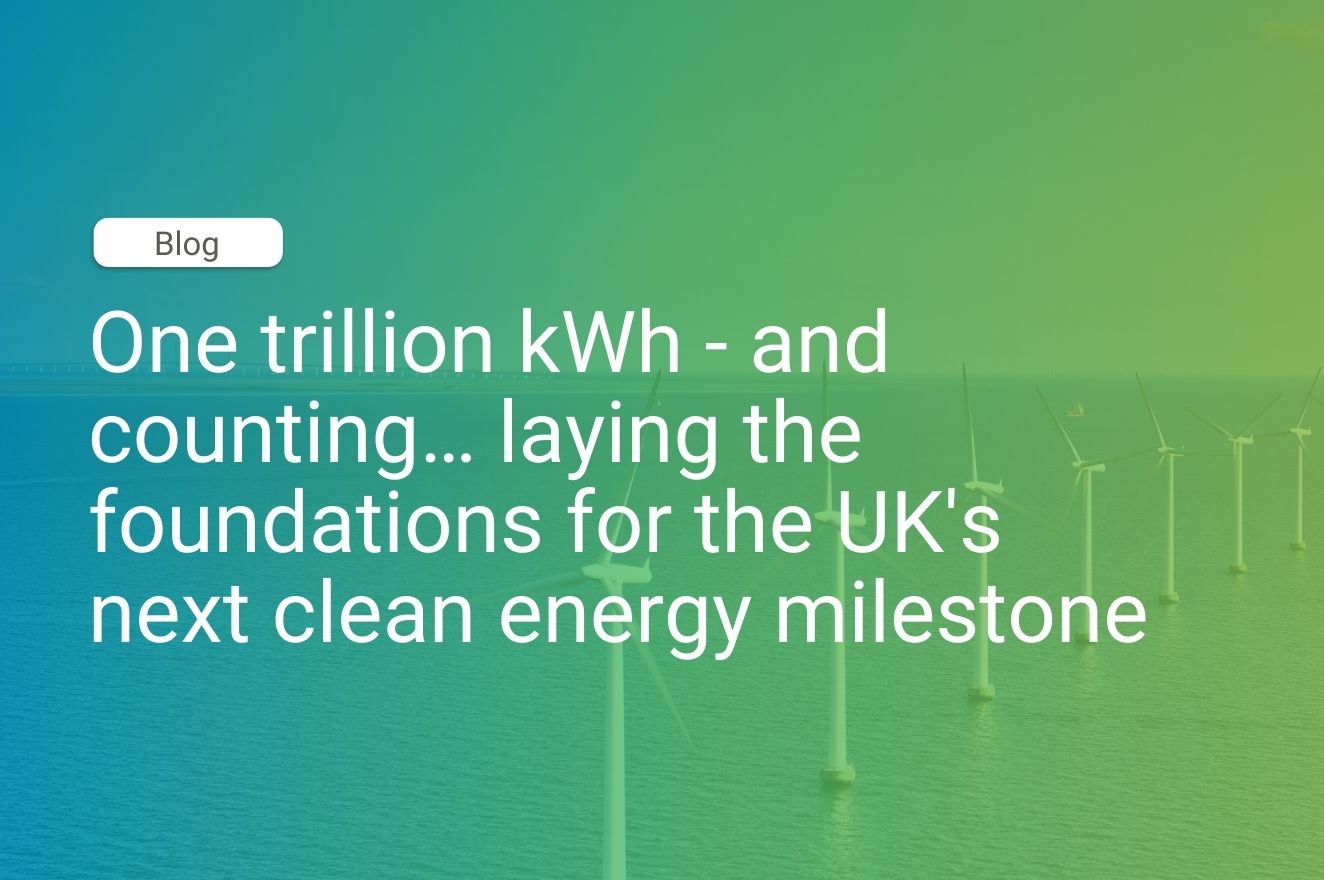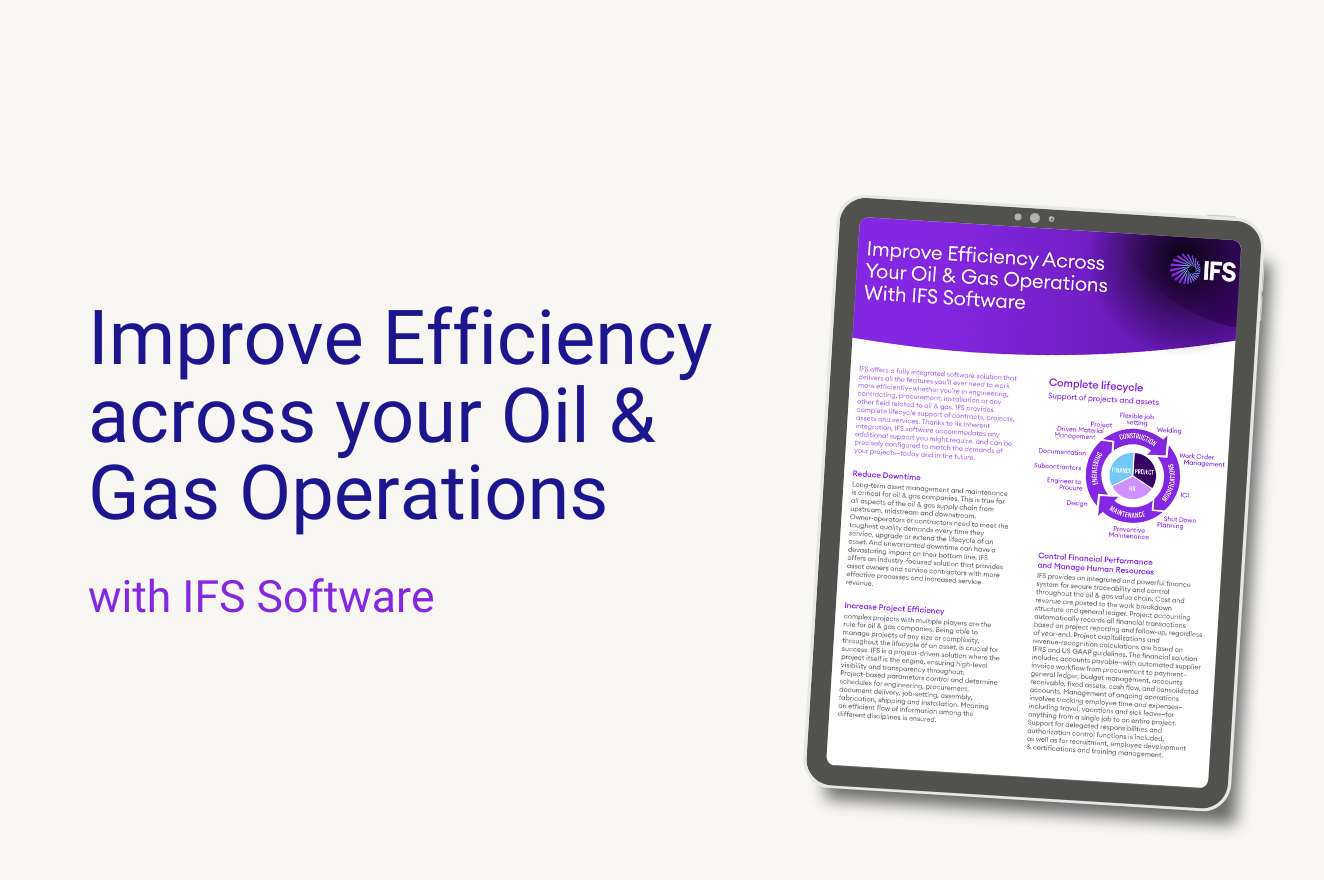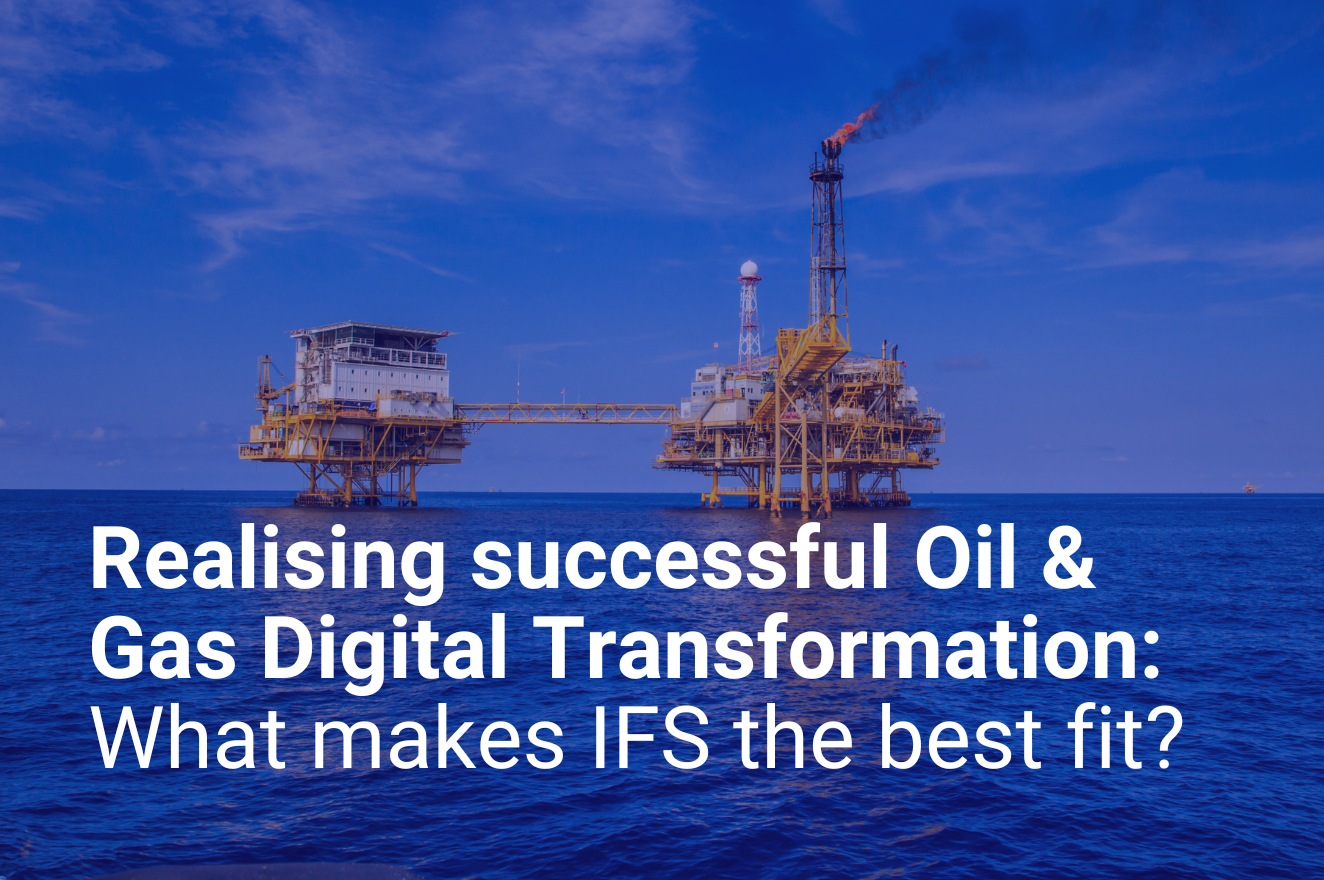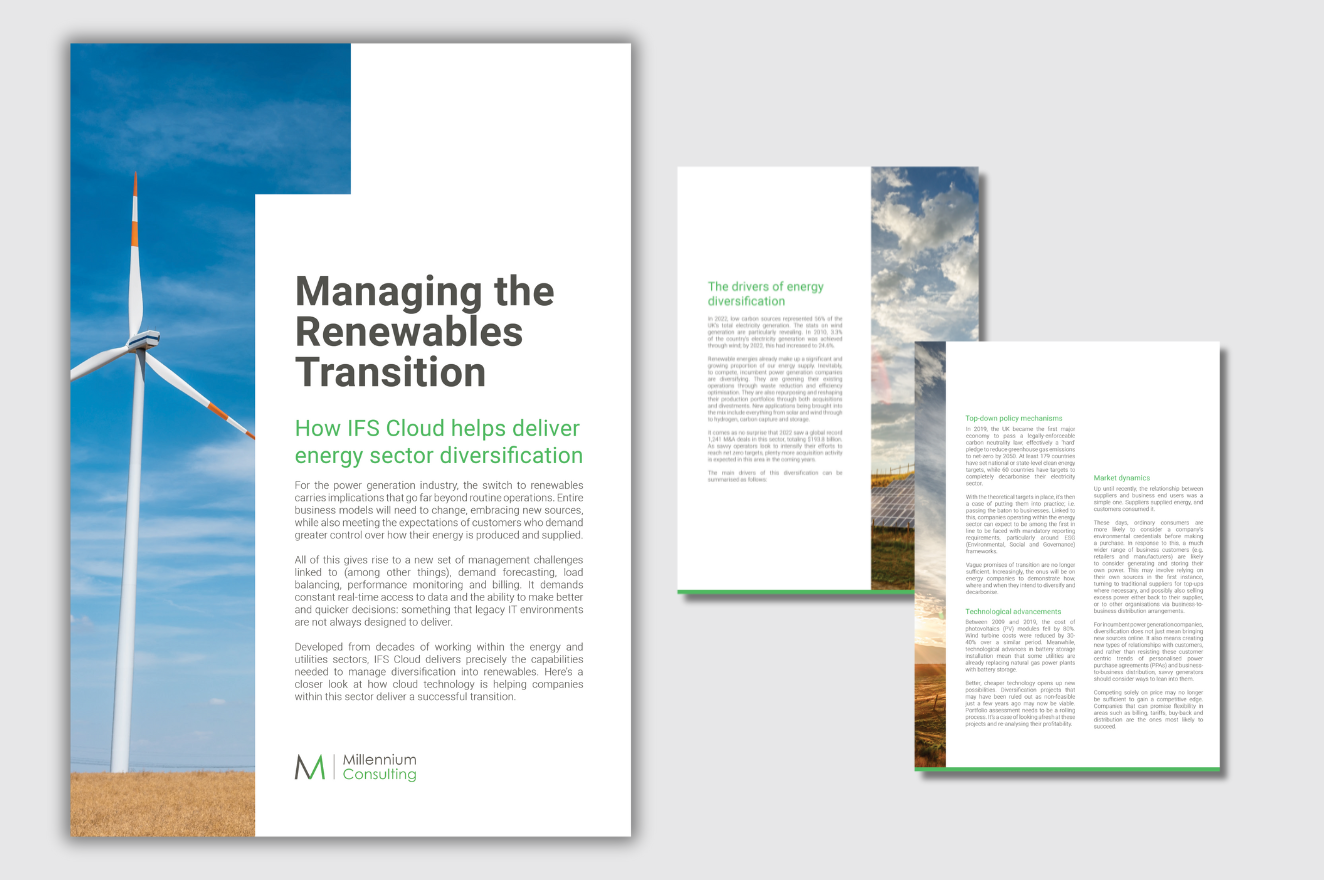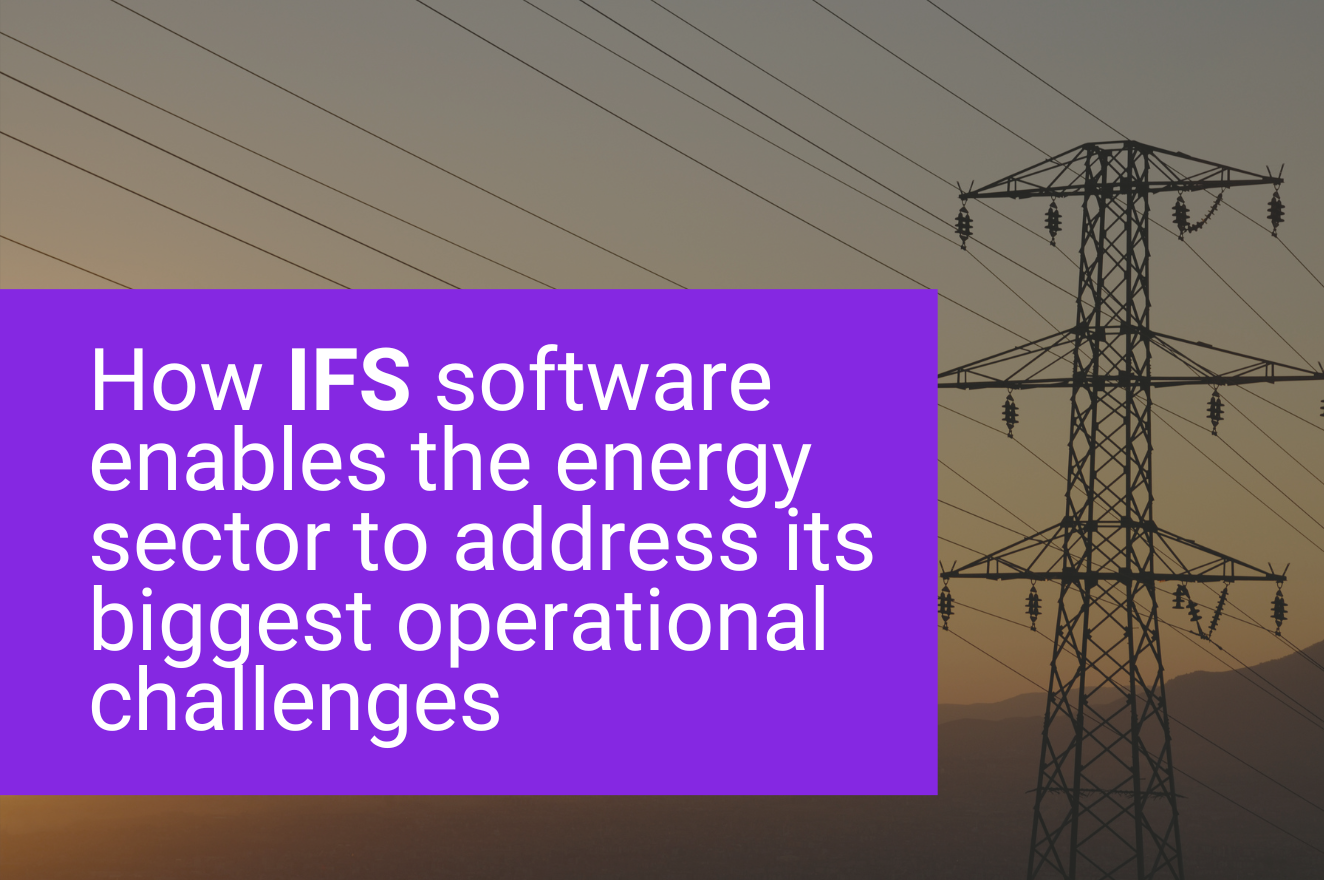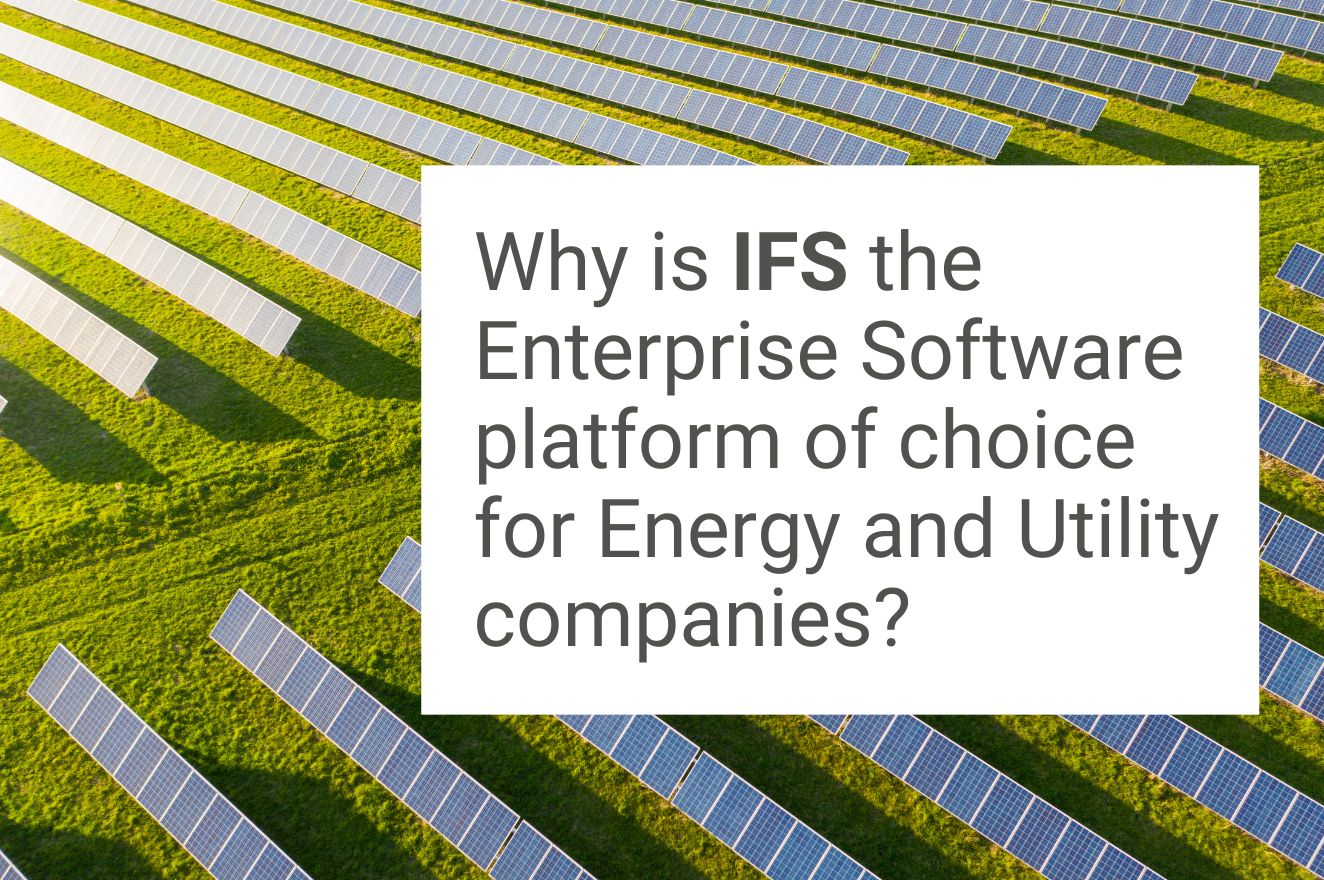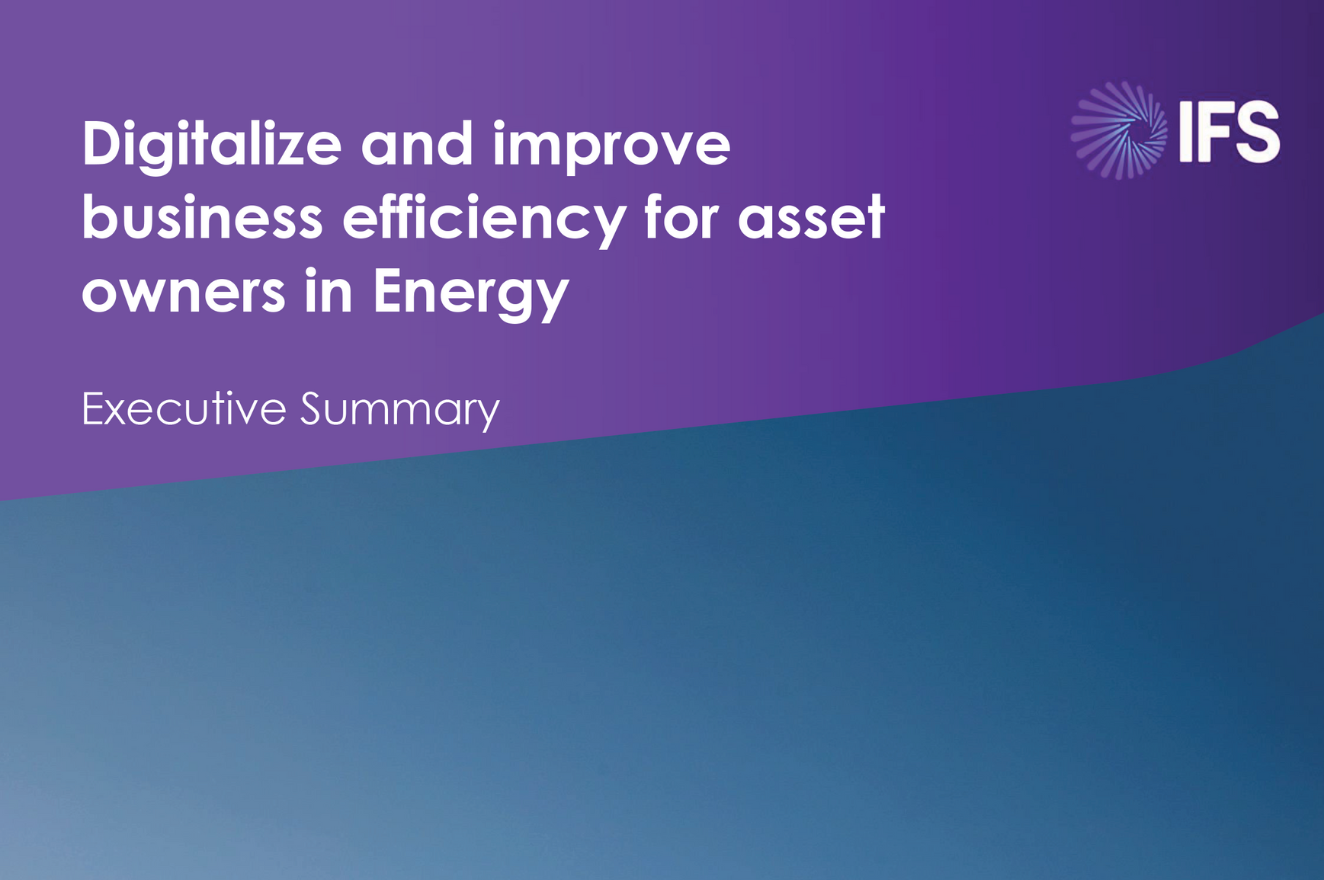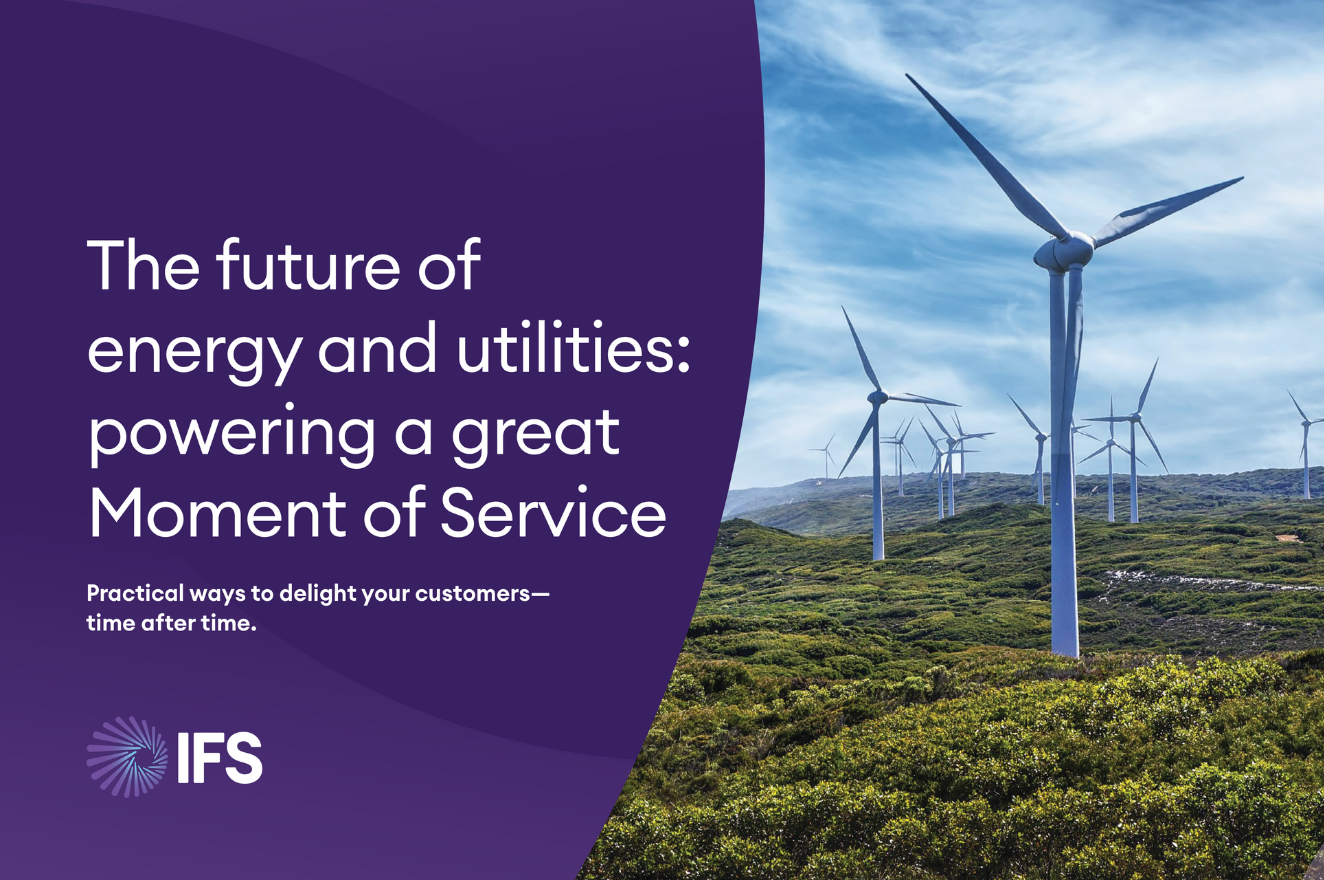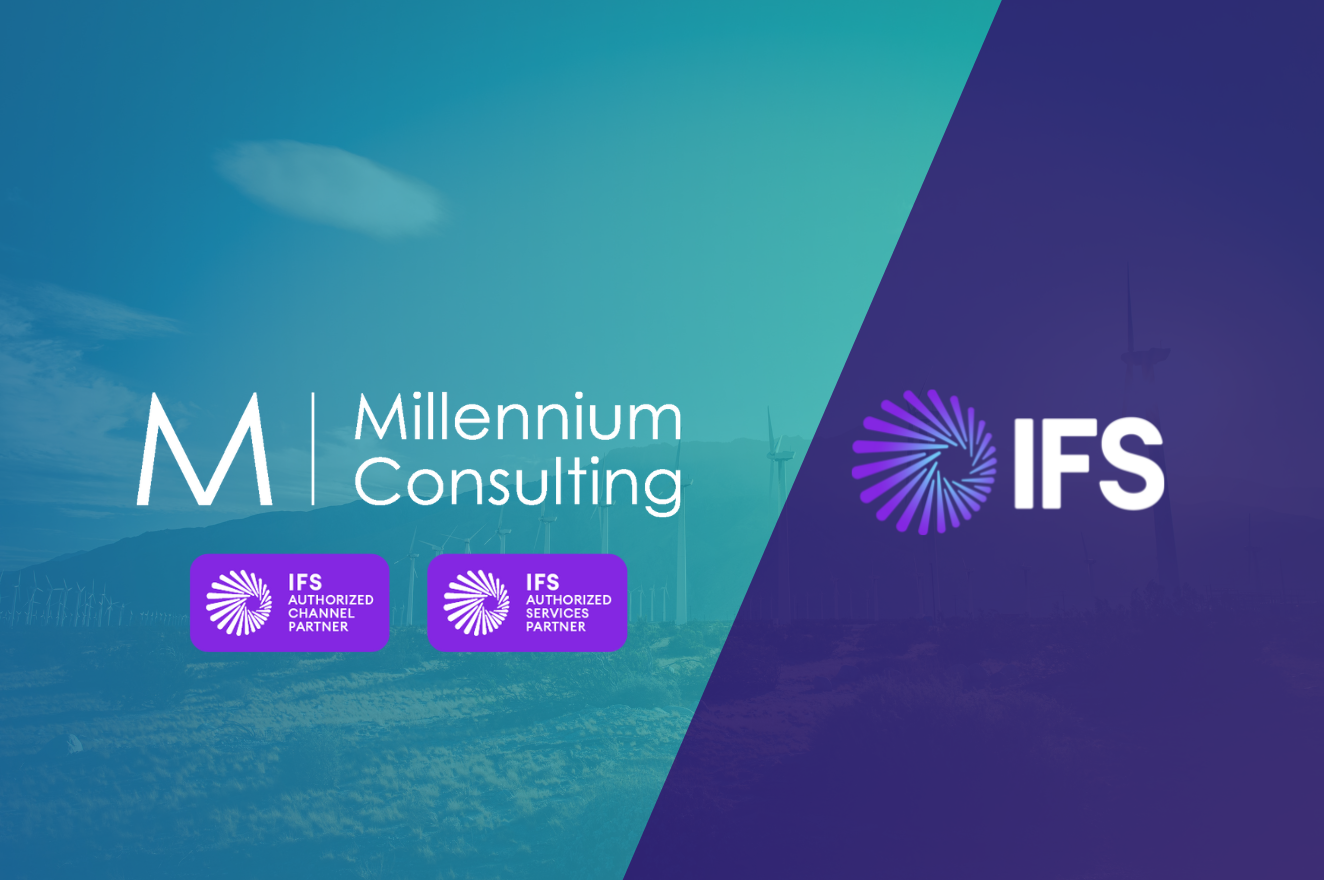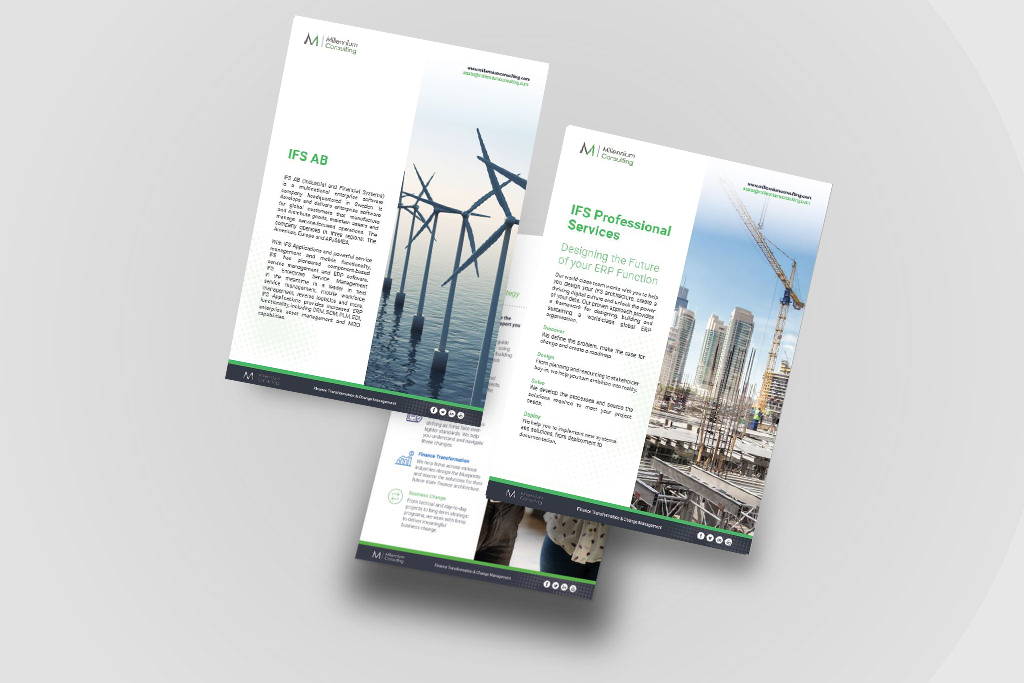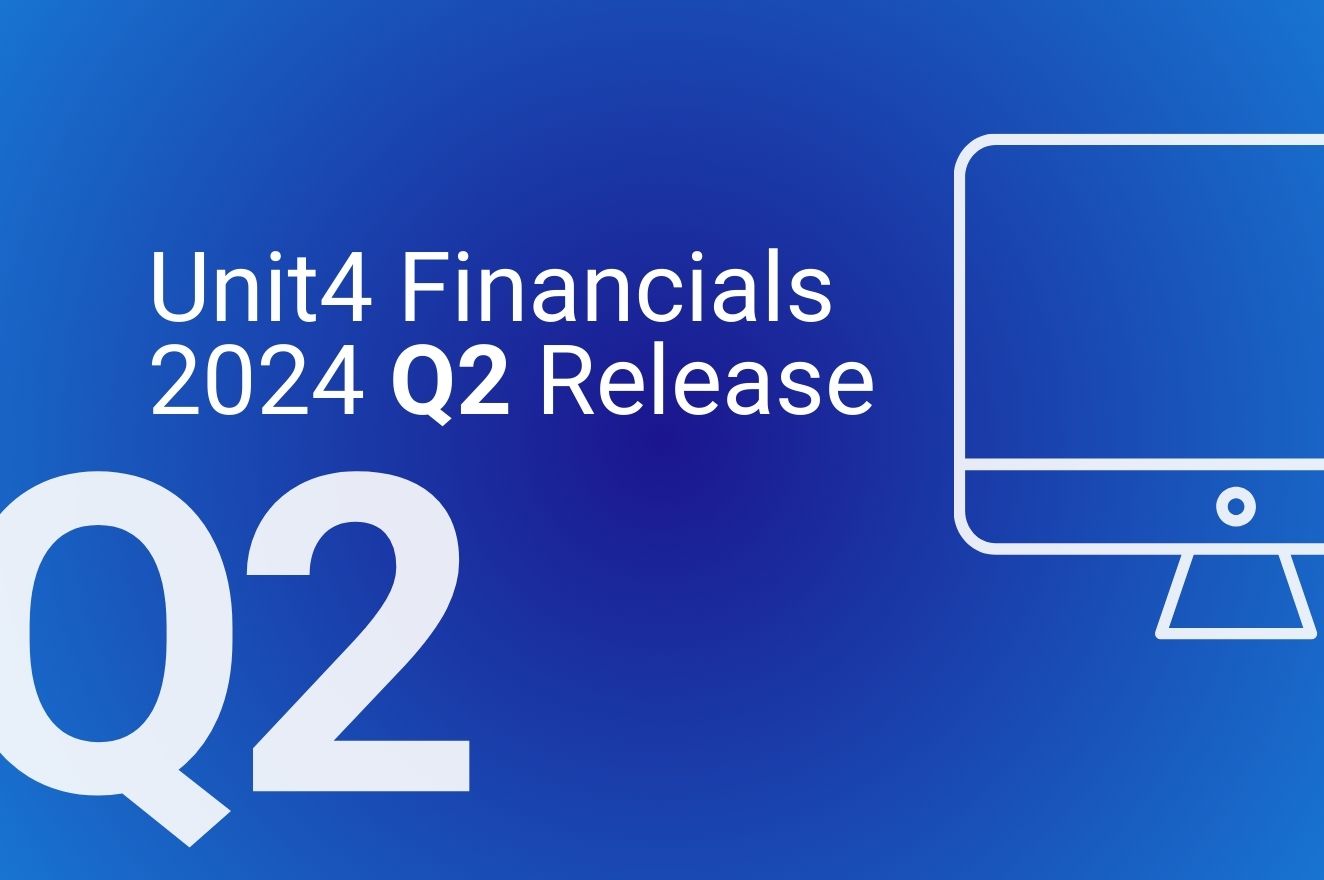UK’s clean energy milestone
One trillion kWh - and counting… laying the foundations for the UK’s next clean energy milestone
Published November 2023
2023 has seen the UK hit a renewables generation record, with one trillion kilowatt-hours (kWh) of electricity generated from renewable energy sources.
As the energy sector looks towards its next big milestones, technologies in areas such as Operation & Maintenance (O&M) and Enterprise Asset Management (EAM) will have a key role to play.
Records in renewables continue to be broken…
Earlier this year, the UK passed one trillion kilowatt hours of energy generated from renewables.
This milestone has been more than five decades in the making. National Grid’s analysis of this dates back to 1970, when renewables represented 1.9% of total generation, with hydro as the main source at the time. Offshore and onshore wind and solar entered the energy mix in 2010.
Industry data shows that this latest milestone is just one of a number of key moments for renewables over the last couple of years:
- In 2020, renewables outstripped fossil fuels for electricity generation over the course of that year for the first time in UK history.
- In 2022, electricity generation from renewable technologies increased to 5% from 39.6% a year earlier, beating the previous record high of 2020.
- In February, May, October and December of 2022, zero-carbon power accounted for over 50% of Britain’s electricity mix. In 2010, it was less than 20%.
- Wind generation in 2022 hit a record high share of 26.8% of total electricity generation.
Next steps - and the challenges that must be addressed
The UK’s first trillion kilowatt hours of electricity took more than fifty years to generate. However, providing that the latest projections stay on track, the second trillion will take just five years. The government’s wider aim is to generate at least 70% of the country’s energy from renewables by 2030.
But of course, none of this will happen organically. For ambitious targets to be met – and for green power generation records to continue to be toppled – it’s going to demand further significant action on the part of all stakeholders.
For producers across the electricity sector, the emphasis needs to be on system optimisation. This includes deploying the right technologies to better manage supply chain pressures and minimise costs. Areas of special focus include the following:

Meeting the scale-up challenge
Policymakers refer to the Balanced Net-Zero (BNZ) Pathway: i.e. a rapid switch from fossil fuels coupled with a lower overall energy demand, with the central aim of achieving net-zero emissions by 2050.
For this to happen, new installations will need to be added to the mix, and elements within the existing renewables value chain will need to scale up production significantly. As a couple of illustrations, McKinsey highlights that for the UK’s BNZ scenario to come into fruition, offshore wind will need to be delivered at 3.0 GW of capacity each year (twice the historic rate). Likewise, solar installations will need to deliver a 30-fold increase in output, to 4.7 GW per-year.
For power generation companies to get the most out of existing assets, certain capabilities are a must. This includes the ability to track real-time asset performance, and to identify minor problems before they translate into downtime.
Designed to meet the needs of the power generation sector, IFS Enterprise Asset Management (EAM) software delivers precisely what enterprises need to maximise production, and make better-informed decisions about how and when assets should be replaced, refurbished or renewed. The aim here is a clear one: extracting maximum value and capacity from your entire asset stack, to help ensure that targets are met.

Tackling supply chain and labour issues
As with all other industries, it is impossible for the electricity generation sector to avoid the knock-on effects of supply chain disruption. Some of the key recent challenges highlighted by Deloitte include limited availability of raw materials coupled with longer lead time for components, supplier-driven cyber risks, and a global shortage of chipsets for components such as solar panels and wind turbines.
The shortage of skilled workers is a further factor that could jeopardise the chances of transition targets staying on track. PwC analysis suggests that in the UK alone, a fresh pipeline of approximately 200,000 people will need training for green energy jobs between now and 2030.
Shortfalls can be addressed in part by reskilling and upskilling workers who will be displaced from areas such as oil & gas, while also widening and diversifying the recruitment pool.
At the same time, businesses will need to think smart when it comes to making the most out of existing workforces. This should include the adoption of technologies such as intelligent workforce optimisation, which makes it easier to balance competing workforce priorities and instigate more efficient task scheduling. Likewise, advanced workforce planning and demand forecasting software should make it easier for businesses to predict when and where workforce gaps are likely to arise – and to plan accordingly.

Futureproofing your technology stack
Visibility across all power generation assets, the ability to drill into operational data and identify areas for improvement, the ability to drive efficiency and bring down costs: these are precisely the type of capabilities power generation companies will need to develop if future targets are going to be met.
A leader in the fields of ERP (Enterprise Resource Planning), EAM (Enterprise Asset Management) and Service Management, IFS is the go-to solution for companies across the energy sector. As a premier IFS Managed Service Provider, Millennium Consulting is ideally placed to help you build the capabilities required to keep targets on track. For further information, please contact Philip Keet, IFS Director.
UK’s first grid-linked solar farm
The UK’s first grid-linked solar farm: Thinking big to tackle renewable bottlenecks…
The arrival earlier this year of the UK’s first grid-connected solar farm was an important milestone in the journey towards net-zero. Phil Keet of Millennium Consulting considers how fresh thinking, updates to network infrastructure and a smarter approach to asset management all have a part to play in ensuring ambitions stay on track.
September 2023
Renewables and the issue of connectivity
Two years ago, the government committed to decarbonising the UK power system by 2035. As the Department for Business, Energy & Industrial Strategy put it, “To ensure this ambition becomes a reality, the government will double down on efforts to deploy a new generation of home-grown technologies – from offshore wind, hydrogen and solar, to nuclear, onshore wind and carbon capture & storage”.
As ever, the devil is in the detail. Policymakers tend to be very keen to talk up their support for individual projects – e.g. those linked to solar and offshore wind – as well as disruptive technologies (advanced modular reactors and carbon capture being just two examples).
However, one important fact is often glossed over. Namely; no matter what disruptive technologies reach fruition in the next twelve years, no matter how many allocation auctions are undertaken and renewables projects get underway, the 2035 carbonisation goal is not going to be met unless renewables can be incorporated successfully into the existing National Grid.
The significance of the Larks Green solar project
The National Grid was designed a century ago at a time when coal was king. The idea is a simple one: you establish your baseline and ramp up or scale down output from your power plants as demand shifts. When similarly easily dispatchable power sources came along (i.e. oil, nuclear and gas), the same principle applied – and those sources were incorporated into the system pretty seamlessly.
Renewables – particularly wind and solar – are, of course, different. The rate of power generation tends to be both intermittent and inconsistent. The grid was meant to fix the problem of meeting demand – i.e. ensuring electricity was transmitted effectively and efficiently to where it was needed. It was never designed to handle a system in which fluctuations and intermittency in supply were the norm.
Owned and operated by Cero Generation and Enso Energy, the new 50 MW Larks Green solar farm near Bristol offers a possible template for tackling some of these issues in the near and medium term.
One of the key characteristics of this new facility is scale. The plant comprises 152,400 solar modules installed in a 200-acre plant close to the National Grid’s 400kV Iron Acton substation. According to the National Grid’s press release, “It will generate over 73,000MWh annually – enough to power the equivalent of over 17,300 homes – and will displace 20,500 tons of CO2 each year compared to traditional energy production.
Secondly, the solar farm is co-located with a battery energy storage system (BESS), meaning that surplus energy generated in conditions that enable peak power generation can be accumulated. This therefore helps to directly mitigate the issue of intermittent and fluctuating generation.
Thirdly – and for this first time for a UK solar project – Larks Green provides a direct connection to the National Grid transmission network. Up until its arrival, all utility-scale solar plants were only capable of being connected to lower voltage local distribution grids. This new development means that the output of a solar plant is no longer confined to a particular area: energy can travel further, meaning that solar plants can be situated in those locations where output will be optimised – but the whole country can reap the direct benefits.
Further work to be done
Large-scale power generation projects twinned with battery storage assets are likely to become an increasingly popular model in the renewable energy market.
However, they are not an instant and permanent fix to all the issues linked to the country’s legacy National Grid infrastructure. According to the BBC’s calculations, there are currently more than £200bn worth of renewable energy projects sitting in the connections queue: the longest queue of any country in Europe.
What this means for companies
For parties involved in renewables projects, the risks associated with grid-related deployment delays need to be considered carefully in the planning process.
This issue also highlights one of the main differences between renewables projects and legacy infrastructure. Grid operators and power producers alike are going to have to come to terms with a proliferation of multiple dispersed projects. The greater the number of individual assets in play, the more challenging it becomes for grid operators to maintain strategic oversight – and for asset owners to monitor and maintain those assets effectively.
So far as reducing deployment bottlenecks is concerned, The National Grid’s ‘Pathway to 2030’ investment package is a step in the right direction, although stakeholders across the industry will obviously be eager to see further action taken at a governmental level.
In the meantime however, producers should act now to ensure that as their asset portfolio is diversified, they have the enterprise asset management (EAM) capabilities in place to ensure that assets are monitored, maintained and used effectively throughout their lifecycle.
Faced with new challenges linked to, for example, demand forecasting, load balancing and the need to minimise costs, sector-specific expertise is a must. A leader in the fields of ERP (Enterprise Resource Planning), EAM (Enterprise Asset Management) and Service Management, IFS is the go-to solution for companies across the energy sector. Find out more here.
As a premier IFS Managed Service Provider, Millennium Consulting is ideally placed to help you build the technological capabilities required for a successful renewables transition. To discover how IFS can help ensure the success of your renewables projects, speak to us today.
Improve efficiency across your Oil & Gas Operations with IFS Solutions
White paper
June 2023
Improve Efficiency across your Oil & Gas Operations with IFS Solutions
Whether you’re in engineering, contracting, procurement, installation, or any other field related to oil & gas, IFS offers a fully integrated software solution that delivers all the features you’ll ever need to work more efficiently.
Discover the latest IFS news
Realising successful Oil & Gas Digital transformation
June 2023
Realising successful Oil & Gas Digital Transformation: What makes IFS the best fit?
With a complex mix of services to manage and challenges to meet, oil & gas decision makers cannot afford to take risks with business-critical software. Sector-specific expertise is a must…
Decision makers approach software procurement with certain outcomes in mind. Typically, these include a desire to improve operational efficiency, boost productivity and gain more effective control over project management. The end goals are improved margins and a more resilient business.
To reach those desired outcomes, a complex operating environment calls for careful choice of technology. This is particularly true for finance leaders in the oil & gas sector who are grappling with a volatile market, rising operating costs, a scattered portfolio of assets to manage and increased regulatory oversight, including pressure to reconfigure the entire business model in line with ESG frameworks.
Challenging conditions call for proven, sector-specific technological solutions. This is where IFS comes in: a global leader in enterprise software, with solutions that cover Enterprise Resource Planning (ERP), Field Service Management (FSM), Asset Management and more.
To date, IFS applications have been deployed successfully in more than 400 projects by oil & gas companies. Here’s a closer look at the reasons why IFS solutions are the ideal fit for the exacting needs of this particular sector.
Ensuring continuity while driving efficiency
The challenge
Finance leaders and operational managers in the oil & gas sector tend to have complex and often competing priorities to juggle. These include the following:
- Continuity of supply. While security of supply is not a new concern, the war in Ukraine has pushed it to the top of the political agenda. In the current climate, an unplanned major outage is as much a political issue as an operational one.
- Cost reduction. In areas such as asset maintenance, this includes optimising inventories of spares and equipment, along with reduction of procurement and shipping costs.
- Alongside any initiatives in play to improve the efficiency of offshore operations, the highest standards for safety and environmental management need to be maintained.
The solution
The IFS cloud-based ERP solution comes with precisely the capabilities planners and operational managers need to meet the challenges associated with the management of offshore assets.
For instance, in the context of maintenance, robust ‘spares & repairs’ inventory functionality makes it possible to plan with accuracy for long lead times in custom fabrication, as well as transport order management.
More accurate resource planning provides greater scope for optimising inventories, lower levels of redundancy, healthier cash flow – as well as the possibility of greater leeway for negotiating lower equipment costs.
On the operational side, it can also mean reduced unplanned downtime and fewer delays due to equipment unavailability.
Eliminating silos
The challenge
Effective planning requires sight of the whole picture. This, however, is often easier said than done: particularly for an enterprise that comprises multiple assets in dispersed locations, and with production flows that span numerous drilling contractors, vessel owners and a multitude of other supply chain partnerships.
The solution
IFS enables you to break down the data silos that can emerge across scattered operational sites. In their place, you can have one version of the truth, and one set of numbers for the entire organisation.
For finance leaders, the solution can help deliver total real time visibility of the global business, including finance, project and asset management, as well as insights on performance across the entire on and off-shore supply chain.
Assets that are ‘in the dark’
The challenge
Collating transactional information from across the enterprise can be a challenge for any finance department. This is especially true for the case of the oil & gas sector – particularly when it comes to the reliable transmission of key financial information from isolated offshore units to onshore locations.
The solution
With experience of meeting the needs of the energy sector since the software’s inception, IFS is well aware of the challenges surrounding the management of scattered assets. Customers get the benefit of IFS Instant Replication as standard. This uses satellite technology to ensure that offshore operations always have system support – even in areas where communication links are poor.
On the other side, IFS Instant Replication also means that your onshore finance hub can always have access to current information on the status of each offshore asset: everything from serviceability and maintenance inventory on hand, through to data on that asset’s performance and contribution to cost and revenue.
Cross-geography initiatives
The challenge
Collating transactional information from across the enterprise can be a challenge for any finance department. This is especially true for the case of the oil & gas sector – particularly when it comes to the reliable transmission of key financial information from isolated offshore units to onshore locations.
The solution
With experience of meeting the needs of the energy sector since the software’s inception, IFS is well aware of the challenges surrounding the management of scattered assets. Customers get the benefit of IFS Instant Replication as standard. This uses satellite technology to ensure that offshore operations always have system support – even in areas where communication links are poor.
On the other side, IFS Instant Replication also means that your onshore finance hub can always have access to current information on the status of each offshore asset: everything from serviceability and maintenance inventory on hand, through to data on that asset’s performance and contribution to cost and revenue.
Project management
The challenge
Especially when under intense pressure to lower overheads, agility is key when it comes to project management. When a viable new opportunity has been identified, rarely is it a case of being able to follow a cookie-cutter workflow. Success depends on the analysis of multiple unique dependencies, along with the ability to track cost, risk and timings in real-time.
Furthermore, problems can arise when organisations have discrete technologies in play for project management and asset management – particularly when it comes to questions over which projects to prioritise in the allocation of limited enterprise resources.
The solution
IFS offers organisations a truly integrated view of performance, with tools that include both project management and asset management via a single platform. This provides for greater visibility, more efficient risk management, and helps ensure resources are allocated and reallocated to deliver the greatest possible value.
Discover more
As a premier IFS Managed Service Provider, Millennium Consulting is ideally placed to support companies across the oil & gas sector as they seek to achieve maximum return on their tech investment.
Please get in touch to discover what’s possible through the IFS platform.
Managing the Renewables Transition
June 2023
Managing the Renewables Transition
How IFS Cloud helps deliver energy sector diversification
For the power generation industry, the switch to renewables carries implications that go far beyond routine operations. Entire business models will need to change, embracing new sources while also meeting the expectations of customers who demand greater control over how their energy is produced and supplied.
Developed from decades of working within the energy and utilities sectors, IFS Cloud delivers precisely the capabilities needed to manage diversification into renewables. Take a look at this white paper as we explore how cloud technology is helping companies within this sector deliver a successful transition.
Unit4 Financials 2024 Q2 Release
June 11, 2024
Still using Excel for planning and analysis?
May 29, 2024
How IFS software enables the energy sector to address its biggest operational challenges
BLOG
April 2023
How IFS software enables the energy sector to address its biggest operational challenges
It is never a case of ‘one-size-fits-all’ when it comes to enterprise resource planning (ERP), enterprise asset management (EAM) and other complex software initiatives. To maximise the chances of a successful project, factors such as sector-specific expertise, vendor reputation and the quality of support on offer must all be given special consideration during the solution selection/procurement process.
This is especially the case for businesses operating within the energy sector. From the revival of the switching economy, through to intense pressure to diversify and decarbonise, energy companies are facing a complex mix of sector-specific operational and market driven challenges at present.
With a track record of serving the needs of the energy sector since its inception, global cloud enterprise software company, IFS is acutely aware of the implications of these challenges.
Here’s how its offerings are equipping energy companies to tackle them head on…
1. Business-wide challenges demand an integrated approach
If a particular plant is hit with performance issues, or a sudden policy shift impacts a niche area of operations, what are the implications for the entire business? What does it mean both operationally – and for your bottom line?
Resource planning and performance management have never been easy for this sector. However, over recent years especially, it seems that the problems faced by energy – political instability, volatile pricing, and, of course, the pressure to hit net-zero, to name just a few – are of a different nature. For one thing, they are less localised: i.e. if an event hits, its implications are rarely confined to a particular business function boundary or geographical area. Another increasing descriptor of such challenges is non-linear: the idea that the full impact of an event or decision is difficult to trace and understand.
For energy enterprises to get a grip on performance and make the right decisions on asset management and allocation, they need clear visibility over all moving parts of the business. This includes linkages to possible early warning signs on performance-related issues. IFS appreciates this better than anyone. Its applications – including EAM, ERP, Enterprise and Asset Lifecycle Management – are made available through a fully composable, integrated platform. It enables planners to collect key information all in one place, get a joined-up picture of performance and make timely, better-informed business decisions.
2. Supporting enhanced customer service
As the price cap gradually becomes redundant, the coming months look set to see a return to competition across the energy sector.
The first stage will most likely take the form of a switching bonanza as customers cast their eyes across a newly competitive market and head for the most attractive tariffs. Beyond this however, savvy operators will be careful to focus not just on price, but on quality of service as a means of securing customer loyalty.
Energy companies need to look carefully at what type of experience customers expect, and whether they are equipped to deliver it. Factors such as speed of response, knowledgeable staff, and consistent, seamless messaging can all offer energy companies the opportunity to establish points of differentiation in the race for both consumers and commercial customers.
IFS applications directly support the development and optimisation of this type of standout customer experience. From human capital management through to customer fault logging, the entire process of service engagement management can be handled on a single platform. These are the building blocks for rapid, consistent service, happier customers and a stronger brand reputation.
3. Ensuring maximum return on technological investments
When market conditions are uncertain, businesses are more likely to think twice about major investments. Against this however, there is a desire on the part of energy companies to boost visibility across their organisations and to ensure they can respond with agility in the face of rapidly changing conditions. As such, despite – or perhaps more accurately, because of – a difficult economy, as many as 60% of businesses plan to increase investments in digital transformation this year.
Businesses are keen to upgrade their capabilities. But with budgets under strain, there is little room for expensive mistakes, and business leaders need to think very carefully about how and where to focus their investments.
Managers responsible for procurement and implementation on major software initiatives need to look very carefully not just at their choice of solutions, but also their choice of vendor. If it is a purely transactional relationship with the vendor attempting to shoehorn the business into a one-size-fits-all solution, the chances of failure are high. By contrast, IFS solutions have been devised and optimised with the needs of the energy sector squarely in mind. This sector-specific expertise helps ensure a genuine strategic partnership, complete with a carefully considered plan for prioritising projects, aligned to the organisation’s goals. This is precisely what companies require to maximise the prospects of success.
4. Helping create more agile businesses
The energy companies most likely to prosper over the coming years will be the ones who can respond with agility to shifting conditions and pre-empt customer demand and expectations. This includes the ability to spot trends in usage demand and behaviour, equipping suppliers with the intel to hone their service offerings accordingly.
IFS applications enable companies to manage and analyse all data relating to customers in a single location. Alongside tools to streamline service management, IFS also offers integrated customer experience management (CXM) software solutions to capture feedback data from customers. Utilising this intel, companies can get a better handle on what is and what isn’t working and focus on service improvements that are in line with customer needs.
Discover more
As a premier IFS Managed Service Provider, Millennium Consulting is ideally placed to support energy companies as they seek to transform their operating models to meet the challenges ahead.
To discover what’s possible through the IFS platform reach out to Philip Keet, IFS Customer Services Director via email or LinkedIn.
Renewable energy to become the world’s top source of electricity by 2025
February 2023
Renewable energy will become the world’s top source of electricity within three years, new data reveals.
According to the International Energy Agency Electricity Market Report 2023, 90% of new demand between now and 2025 will be covered by clean energy sources like wind and solar, along with nuclear energy.
This growth in output means that renewables will become the world’s largest electricity source within three years – providing 35% of the world’s electricity and overtaking coal.
"The world’s growing demand for electricity is set to accelerate, adding more than double Japan’s current electricity consumption over the next three years. The good news is that renewables and nuclear power are growing quickly enough to meet almost all this additional appetite, suggesting we are close to a tipping point for power sector emissions."
— IEA Executive Director, Fatih Birol
IFS has Renewable Energy Market Solutions
IFS offers the best engineering services and industrial processes to clients involved in various industrial manufacturing sectors. IFS also provides efficient, environment-friendly renewable energy solutions for your renewable energy sector needs.
Why is IFS the Enterprise Software platform of choice for Energy and Utility companies?
December 2022
Millennium Consulting has recently partnered with global cloud enterprise software company, IFS AB. A leader in the fields of ERP (Enterprise Resource Planning), EAM (Enterprise Asset Management) and Service Management, IFS has been serving the needs of energy and utilities companies since its inception.
In Oil & Gas, Power Generation, Transmission & Distribution and Water, the need for best-of-breed cloud enterprise software has never been greater. This is a sector where sustainability requirements and rapidly shifting customer expectations are shaping the future. As a consequence, companies are increasingly having to rethink their business models, diversify their offerings and get a tighter grip on asset management. Here’s a closer look at how IFS is equipped to deliver these capabilities…
An integrated platform, delivering a holistic view
Energy companies often comprise a complex portfolio of assets scattered across multiple locations. The drive to net zero undoubtedly represents a huge strategy shift. This coincides with a host of pressing operational challenges, including the need to manage and reduce operational costs, while also ensuring the reliability and safety of existing assets.
In short, organisations within this sector have complex requirements; and those requirements are simply not going to be met by generic, one-size-fits-all planning and enterprise management solutions. Covering areas such as project management, plant maintenance, supply chain and human capital management (to name just a few), the components of IFS are hardwired to meet this sector’s specific needs. In fact, the company has been meeting the needs of this sector right from its earliest days.
Crucially from a strategic point of view, these capabilities are offered on an integrated, composable platform. Your in-the-field leaders responsible for projects, assets and service levels certainly get the benefit of best-in-breed operational management tools. But alongside this, CFOs and other board-level executives get an up-to-date, joined-up picture of performance. In terms of strategy, this puts you in a much stronger position to highlight efficiency opportunities, reduce costs and optimise processes.
The three core offerings delivered by IFS – ERP, EAM and Service Management – complement each other, enabling businesses to consolidate operations, support growth initiatives and improve customer service. This speaks directly to some of the biggest challenges currently faced by the energy sector. These are just a few illustrations of how the capabilities offered by IFS can make a difference to your organisation:
- Use IFS to adopt an end-to-end solution to support the entire lifecycle of assets, from feasibility assessments to operation and maintenance.
- Modernise field operations and get a single view of the truth across asset management, technician schedules, customer systems and outage use cases. IFS’ acquisition of Clevest in 2020 enables the company to deliver a combined enterprise asset management (EAM) and Mobile Workforce Management MWM offering: something that has helped IFS earn a place in the Gartner Market Guide for Mobile Workforce Management Software for Utilities for the eighth year in a row.
- For onboarding new assets (e.g. when diversifying your portfolio through renewables initiatives), use IFS Projects to manage the complete project lifecycle.
- What are your options for reskilling and/or redeploying existing employees to reflect changes in your operating model? Use the IFS Human Capital Management components to analyse resources and ensure alignment with organisational strategy.
While current geopolitical crises have temporarily curtailed contract-switching activity, we can, of course, expect it to return with a vengeance once supply issues have settled down.
In both utilities and power distribution, customers demand reliable and exceptional service at their fingertips. In practical terms, this involves a timely response to queries, and technicians turning up when they are supposed to. This is another key area where the integrated architecture incorporating the Internet of Things (IOT) and energy/utilities-specific capabilities of IFS prove particularly valuable. Workforce, asset management and customer service components exist on a single platform, with the ability to communicate with each other. There’s an opportunity here to ensure complete alignment of all stages of each service engagement, from customer fault logging to ultimate resolution: a huge boost in enabling enterprises to maintain and grow their reputation for quality of service.
As well as its formidable track record, it was also the ambition and transparency of IFS which led Millennium Consulting to partner with this particular vendor. This is a company that seeks to be as much a strategic partner with energy companies as a product vendor: one where the various solution components look set to continually evolve in line with the challenges faced by the sector. Recent presentations from IFS leaders explain this ambition.
We know that this sector is no stranger to innovation, whether it’s AI-driven maintenance solutions and the use of augmented reality in tandem with robotics, through to predictive analytics and machine learning to anticipate demand. To reap the full benefit of these developments, businesses need a way to utilise the data generated by such solutions into their strategic planning processes.
Rather than being based on monolithic code blocks, IFS comprises a multitude of software components linked through application programming interfaces (APIs). In other words, the architecture is flexible; enabling integration with whatever advanced operational capabilities your organisation may be seeking to implement.
An independent IDC analysis found that IFS users benefit from an average 18% productivity gain. The company is committed to ensuring maximum ROI for customers through its unique approach to Business Value Engineering. Deploying sector-specific expertise, IFS offers its customers a Digital Business Value Assessment, whereby specific opportunities, cost reductions and process improvements are identified. This is used to frame the solution scope and define implementation success.
Right across the energy and water sectors, the eyes of regulators, investors and end users are on organisations, ready to scrutinise their sustainability credentials. Companies need a robust framework for formulating ESG (environmental, social and governance) goals, and for translating those goals into action.
The IFS ESG component speaks directly to this need. Key features include the ability to track emissions right across the enterprise, an enhanced ability to factor in environmental costs in planning processes, and a capability within the Service Management module to reduce waste by facilitating the easy identification and recall of underused inventory.
Where to next?
For energy and water companies, IFS offers the opportunity to supercharge digital transformation initiatives and to significantly boost your ability to tackle some of the sector’s most significant operational and strategic challenges. To discover what’s possible, speak to Millennium Consulting today.
Discover the latest IFS news
Digitalise and improve business efficiency for asset owners in Energy
August 2022
IFS is the market leader providing business software to the energy industry, working with more than 400 projects and/or asset-driven companies.
Many of the companies in the energy industry are diversifying away from major reliance on oil & gas revenue and embracing the journey to net zero—and, more specifically, renewable opportunities. This requires them to adopt an agile mindset and ensure that their enterprise software solutions are flexible enough to support new business models and ways of working.
This white paper explores ways for asset owners to digitalize to improve business efficiency, reducing cost and secure asset uptime with built-for-purpose supply chain management.
The Future of Energy and Utilities
August 2022
Build a better future for Energy and Utilities
There’s a bold new future ahead for the energy and utilities sector
The global movement towards sustainable energy and carbon-free solutions is driving significant change. As is the move to build and service smart, connected cities and communities.
Ensure that your business is able to keep up with these industry changes and focus on services and outcomes instead of products that will allow you to orchestrate your customers, people, and assets as your business transforms.
This white paper will outline some of these key challenges in the Energy and Utilities sector, and highlight practical ways to deliver the Moment of Service that will delight your customer—time after time.

